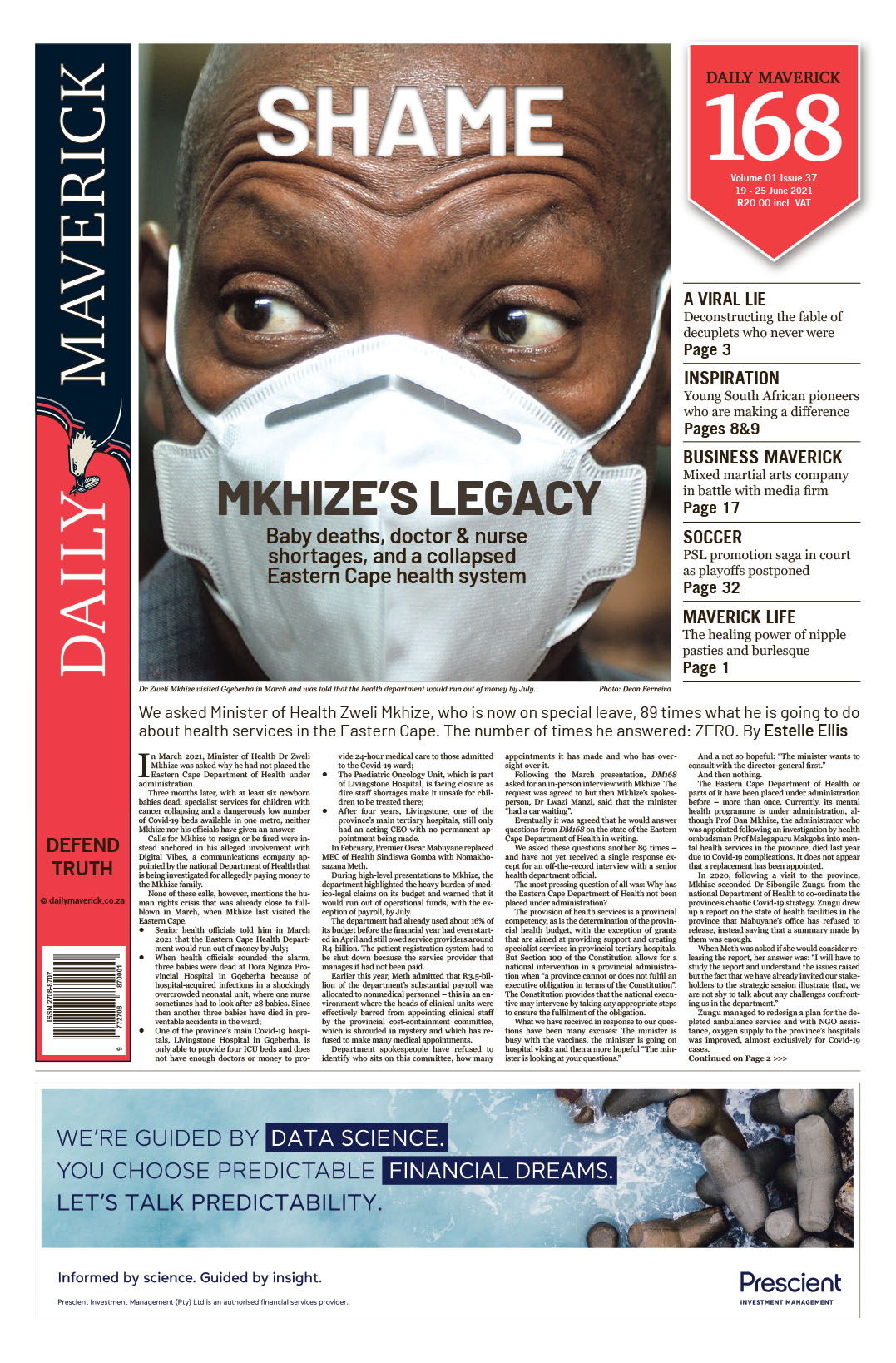BUSINESS MAVERICK 168
South Africa moves ahead cautiously with proposed regulation of the crypto space

Daily SA trading hit R2-billion in January. Government wants oversight.
First published in the Daily Maverick 168 weekly newspaper.
The increasing use of crypto assets, including Bitcoin, has led regulators to take steps towards bringing them under SA regulation, providing investors with protection they don’t currently have.
A position paper recently published by the Intergovernmental Fintech Working Group (IFWG) confirms that initial steps taken towards regulating the crypto space in 2014 will now be firmed up. The paper makes 25 recommendations for a phased-in regulatory approach. The IFWG is a joint initiative including the National Treasury, the Financial Sector Conduct Authority, the South African Reserve Bank, the South African Revenue Service and the Financial Intelligence Centre (FIC).
IFWG chairperson Olaotse Matshane points out that the crypto-asset ecosystem has grown to include more than 10,000 unique crypto assets. “Global daily trading values have also increased significantly over the past few years, currently averaging in excess of $200-billion, and on some days exceeding $400-billion. While crypto assets’ viability as a widely used means of payment remains untested and an open question, the market has demonstrated significant resilience over the last decade. The use cases for crypto assets as an alternative – albeit highly speculative and risky – investment class and as a cross-border remittance instrument, appear to be gaining some traction among retail customers,” she says.
One of the proposals is that crypto asset service providers must adhere to legislative requirements at combating money laundering and financing of terrorism. Service providers will have to register with the FIC, conduct customer identification, verification and due diligence, keep records of clients and transactions, monitor for suspicious and unusual activity, and report such transactions, including all cash transactions of R25,000 or more, to the FIC.
Marius Reitz, general manager for Luno Africa, a global cryptocurrency company and one of the largest in SA, says Luno has been self-regulating in the absence of formal regulations, but regulation will provide legitimacy in future. “Imposing regulations in South Africa will enhance general trust in and stability of the market. It may also result in even more talent and investment capital flowing into the industry, unlocking more business models and bringing more advanced products to market,” he observes.
Current exchange control regulations do not explicitly cater for crypto, implying the Reserve Bank does not have explicit powers to require local crypto-asset trading platforms to report transactions. Daily trading values in SA exceeded R2-billion for the first time in January 2021, providing anecdotal evidence that there may be significant value moving into crypto assets without the Reserve Bank having oversight over such flows, or the requisite powers to direct market behaviour as appropriate for SA.
Matshane says crypto-related activities are likely to increase, and inaction by SA financial regulators could accelerate the creation of unregulated parallel systems. “This could continue to prevent authorities from having ‘line of sight’ of crypto asset-related activities and developments. By gradually bringing crypto assets into the South African regulatory purview, the most pertinent and immediate risks … around the financing of terrorist activities, cross-border financial flows and consumer protection will be addressed,” she says.
But she cautions that the decision to regulate these assets does not signal their endorsement by the government or regulators or members of the working group. “Crypto assets remain highly volatile and inherently risky given that they offer a direct, peer-to-peer transactional capability that does not require a financial intermediary, such as a bank,” she says. This raises the challenge of responsibility: consumers have no recourse to any authority if there are problems or to resolve errors such as using the wrong crypto-asset address or sending Bitcoin to an Ethereum address.
The already high inherent risks of crypto assets are compounded by scams: many Ponzi-type schemes use crypto assets as a lure to justify excessive promised returns. “Crypto-asset marketing material is often strongly biased, highlighting only the potential upside of crypto assets, with little or no consideration of the massive potential downside… Consumers are strongly urged to ensure that they fully understand the products and services … as well as the associated risks. Consumers are also urged to ensure that they only deal with registered and regulated CASPs [crypto asset security programmes],” she says.
The IFWG intends to follow six principles in the regulation of crypto assets:
- They must be regulated appropriately;
- An activities-based perspective must be maintained, and the principle of “same activity, same risk, same regulations” must inform the regulatory approach;
- A risk-based approach to crypto asset regulation must apply;
- A truly collaborative and joint approach to crypto asset regulation by the IFWG must be maintained;
- The dynamic development of the crypto market must be proactively monitored and knowledge on emerging international best practices maintained; and
- Digital literacy and digital financial literacy levels must be increased among consumers and potential consumers.
Reitz says SA is one of a few countries in Africa looking into how crypto can slot into new regulations or whether new bespoke regulations should be drafted. “SA is leading the charge on the continent by putting forward a firm proposal for comment,” he says.
Other countries are starting to pay attention. The People’s Bank of China issued a statement last month reiterating that banks and online payment companies may not offer crypto-related services, such as account openings, registration, trading, clearing, settlement and insurance.
Cryptocurrency is legal in the US and is not comprehensively regulated, although the Internal Revenue Service defines it as digital property. Crypto exchanges fall under the European Union’s anti-money laundering regulations. Japan led the charge in 2017, legalising cryptocurrency under its Payment Services Act. DM168
This story first appeared in our weekly Daily Maverick 168 newspaper which is available for free to Pick n Pay Smart Shoppers at these Pick n Pay stores.





















 Become an Insider
Become an Insider
“One of the proposals is that crypto asset service providers must adhere to legislative requirements at combating money laundering and financing of terrorism. ” – how about “traditional” licensed and regulated players get that right? Gupta’s much…. and so many others…. suggest the regulator focusses first on the legacy financial system in order to ensure that the vastly larger AUM and transaction volumes and values are protected and AML etc is adhered to.
I will forever be grateful to the team of hackers at REFUND POLICY after they successfully helped me recover $ 61 k worth of bitcoin that I had lost to a fake crypto investment platform I found on Facebook. I got really depressed and suicidal having lost such amount of money, I then discussed my predicament with my younger sibling who then introduced me to this hacker they went to college together. At first, I was reluctant to contact the hacker as I thought it will be impossible for the bitcoin I had sent to be recovered, but I am so glad that I did contact them because it was like magic after only 18-20hrs they were able to help me recover my lost bitcoin. They even told me that it took the long 18-20 hrs because the sc^mmers had moved the bitcoin from the wallet i paid to into another one. I will forever be grateful to REFUND POLICY, that’s why I am going to drop their contact details here incase anyone has been a victim of any crypto scam, it is not too late at all. Email: refund policy 82 at g mail dot com and their whats app is : + 1. 626. 770. 9574. Do not hesitate to get in touch with them.